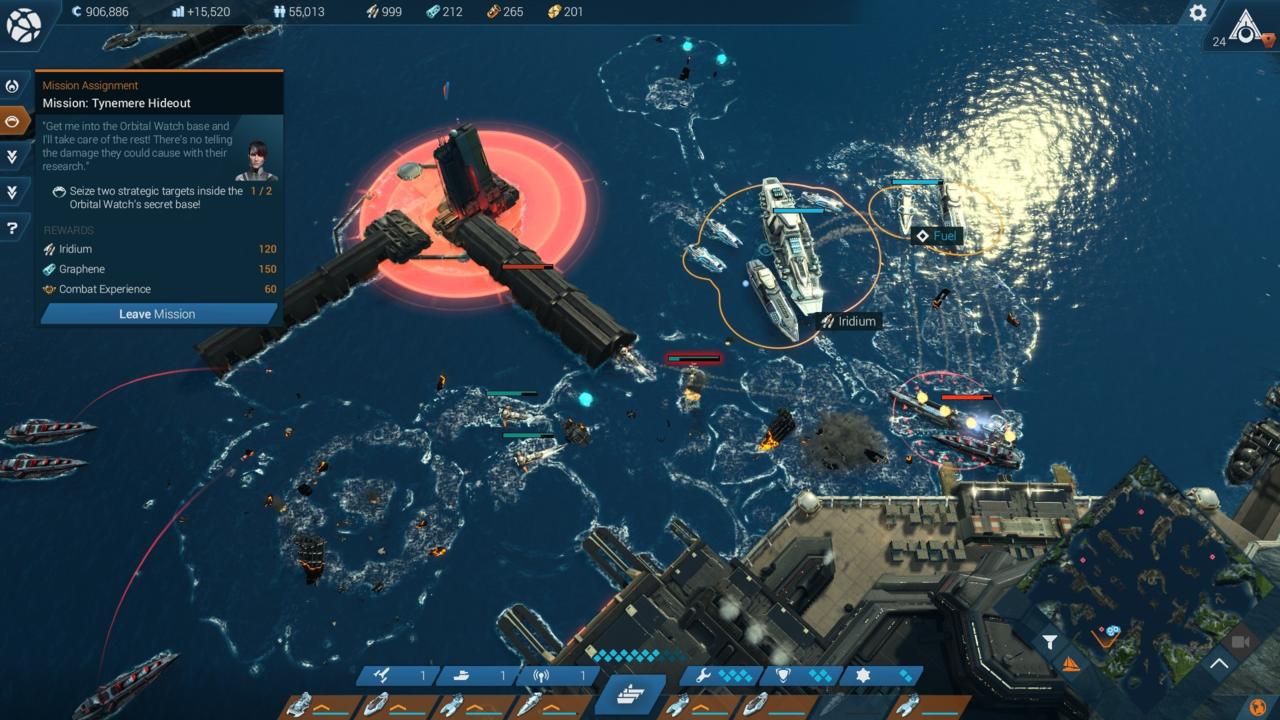Imagine a future where global warming has melted the Earth's ice sheets, and all that's left is a fractured society desperate to pick up the pieces and build anew on the few islands that remain. This is the setting of Anno 2205, a game where you side with one of two competing corporations to rebuild civilization, and eventually, construct a fusion reactor on the moon for a limitless resource of clean energy.
Thankfully, humanity doesn't have to start from scratch. During your campaign, you have access to bits and pieces of advanced technology leftover from Earth's better years, but there's still a lot that needs to be rebuilt. That's where you come in. You're responsible for constructing new houses, roads, and factories, plus all the logistical systems that are required to support and transport all of your goods.
Like most city-builders, construction is handled with a straightforward system of dragging and dropping elements from a menu onto a map. Anno 2205 makes construction a simple affair; even more so than usual. It adapts the series' mechanics to work within the constraints of a flooded, land-starved Earth, allowing you to tack modules onto existing properties to boost resource production, rather than having to construct entirely new buildings that eat up your ever-valuable real estate. Unlike most games in the genre to force you to permanently commit to decisions, you can also reposition elements after they're built in Anno 2205, which makes it easy to react when things don't go according to your original plan.
You can eventually take on bigger construction projects that unlock new areas, including arctic settlements, additional islands, and, yes, the Moon. These projects require huge chunks of resources, however, and given that you earn funds at fixed intervals while playing, you have to do an awful lot of waiting before you can enjoy building and managing greater expansions. Anno 2205 accounts for this by giving you optional, secondary objectives to help pass the time.
Every so often a terrorist organization launches attacks on supply lines and climate regulators. When they do, you can engage in a military mission to capture and control the objectives in question. While on these excursions, you continue to earn resources back home, and your bank account--provided you were running with a budget surplus when you started the mission--will continue to grow. If you're in the red, though, you'll often come back to find that you need an emergency loan to keep your corporation afloat.

Unfortunately, Anno 2205 isn't a very challenging game. Every resource is inexhaustible, or close to it, and any city you build will stay stable for quite a long while. All you need is enough cash to lay down a ton of houses to attract workers, then build up factories, upgrade your workers, upgrade the factories, and repeat. Once you've got that cadence down, not only do missions become trivial, but the campaign flies by in a couple of hours.
Military missions aren't much better. Even on higher difficulties, you can survive by employing the most basic tactics. As you move through a map, you regularly discover and acquire new tools in the form of missiles, mines, and support craft, and as a result, your over-powered military rarely faces an enemy it can't beat. It's a shame that Anno 2205 is so easy to figure out, because alternating between two distinct modes creates an enjoyable dynamic at first. But after a while, the lack of challenge in either mode leads to boredom, and you begin to dwell on how shallow each experience is in isolation.
If anything is the killer here, it's how short the campaign is overall. I finished my first run after five hours, and subsequent playthroughs went by even faster. City building games have always been about maintaining balance. Tweak this thing here, another thing there, and wait to see if the effect was what you expected or needed. In Anno 2205, the rules and processes have been streamlined so much that you're robbed of this challenge. Cities' behavior are so predictable that it's far too easy to build everything you need and wait for everything to work itself out.

Balance issues aside, Anno 2205 has technical peculiarities that leave a bad taste in your mouth, too. It constantly simulates activities across multiple settlements in the background, but it takes a while for the game to load maps when you switch from one to the other. When planning out coordinated expansions that require two sets of resources from distant locations, you need to endure these frustratingly long loading times as you repeatedly shift your view from one map to the other. It's not game-breaking, but its a regular annoyance that impedes on your enjoyment.
My machine is about as top-of-the-line as they come, and I also noticed some nasty frame-rate dips after a couple of hours that, while not making the game unplayable by any means, made it obnoxious to wrestle with. Adjusting graphical settings had unpredictable effects on the game's performance, making optimization a tricky affair overall.
It's a shame that Anno 2205 takes the game so far into the future and does so little of substance with that premise. Not much has changed from Anno 2070, and what has is almost always worse. Anno 2205 still has a sturdy core of satisfying city planning and construction, but so much has been cut out as to make the game barely worth playing at all.